Logic and Intuition
Kainan Jarrette and Diana Daly
What are Logic and intuition?
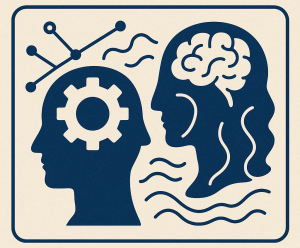
Logic is the set of rules and principles we use to determine whether a conclusion correctly follows from the information or assumptions of an argument. (An argument, in this context, is essentially the claim that’s being made, including how that claim is backed up.)
Intuition, in contrast, is the immediate sense that something is true or accurate without consciously thinking through reasons or evidence.
Another way to think about this is:
- Logic is a conscious and multi-step process (deliberate reasoning).
- Intuition is an unconscious and instantaneous process (spontaneous feeling).
How We Use the Term “Logical”
In everyday speech, the word “logical” is often used to represent that something makes intuitive sense to us. When we say something like “that sounds logical” in an informal conversation, we usually mean “that sounds correct to me without having to think it through.”
In a technical sense, however, this usage isn’t very accurate. Logic and intuition are complete opposites of each other, and it would probably be more appropriate to say “that sounds intuitive” than “that sounds logical” in the context mentioned above.
So remember that in this textbook when we say something is “logical” we don’t mean it’s intuitive. We mean it was arrived at through a conscious and rational process of reasoning.
where Intuition fails
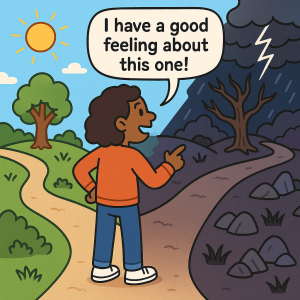 Broadly speaking, intuition and logic can both serve useful purposes, depending on the situation. For instance, intuition is useful when we have to make low-stakes decisions around personal preference (e.g. choosing what to eat for breakfast).
Broadly speaking, intuition and logic can both serve useful purposes, depending on the situation. For instance, intuition is useful when we have to make low-stakes decisions around personal preference (e.g. choosing what to eat for breakfast).
However, when it comes to assessing information and determining truth, intuition is unreliable, prone to error, and often actively harmful.
Below, we’ll go over some areas where intuition fails us, and why that is.
Probability and Statistical Thinking
Test Your Statistical Intuition!
Did you do better or worse than you expected?
We didn’t evolve to be able to grasp extremely large numbers, randomness, and chance. As a result, our intuition about these concepts is very inaccurate. In fact, there’s a whole list of just statistical errors1 we tend to make. These include:
- Overestimating the likelihood of rare but dramatic events (like plane crashes)
- Underestimating the role of randomness (like when we’re gambling)
- Misunderstanding base rates (like in medical diagnoses)
Correlation and Causation
A correlation-causation error is when we incorrectly2 assume that because there is a correlation between two things, one must be causing the other. We evolved to seek out patterns, and we intuitively assume connections that often aren’t really there. This works well for surviving in the wild, but not so much for navigating a complex civilization.
Correlation-causation errors can lead us to falsely believe things like:
- Video games cause violent crime [they don’t!]
- Vaccines cause autism [they don’t!]
- Presidential administrations cause gas prices to rise or fall [they don’t!]
Large-scale Systems and Abstract Data
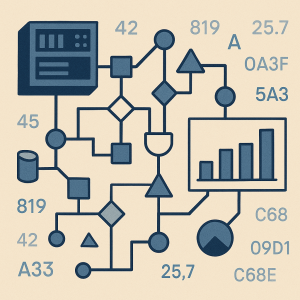 We evolved to deal with small groups and visible, quick cause-and-effect relationships. Our intuition falls apart when dealing with large and complex systems3, especially when those systems have delayed feedback (meaning there’s a large gap in time between an action and its consequences). This leads us to struggle to understand things like:
We evolved to deal with small groups and visible, quick cause-and-effect relationships. Our intuition falls apart when dealing with large and complex systems3, especially when those systems have delayed feedback (meaning there’s a large gap in time between an action and its consequences). This leads us to struggle to understand things like:
- Global economic models
- Pandemics
- Climate and ecological systems
Confirmation and Disconfirmation of Beliefs
As we discussed in the previous chapter, our cognitive bias leads our intuition to focus on things that confirm our existing beliefs and ignore things that don’t. This leads to:
- Believing a stereotype is true because we’ve “seen it happen” — even though there were likely many more examples where it didn’t happen that we ignored
- Needing only a few confirming anecdotes to increase our confidence in a pre-existing belief, whereas we need many more disconfirming anecdotes to weaken that same belief
Assessing Our Own Competence and Knowledge
Consistent with our poor intuition for statistics and large numbers, we also tend to have poor intuition when it comes to our own competence and knowledge. We tend to:
- Overestimate4 our knowledge and understanding of a topic
- Rate5 ourselves as better-than-average in most domains, even when we’re not
Understanding “Average”
When we talk about being “average” in a domain, there are some important things to remember:
Average Is Not the Same Thing as Poor.
By definition, extremely high or extremely low ability is rare. We live in a world where there is often an intense pressure to be exceptional, but this pressure is unnecessary and misguided. Average doesn’t mean you don’t know what you’re doing, it just means you know what you’re doing about as well as most other people in that domain.
Average in a Domain Doesn’t Mean Lack of Uniqueness as an Individual.
While we can assess ability in different specific domains, an individual person is an incredibly complex bundle of a wide variety of traits that are shaped by an incalculable number of influences. Just because, for instance, you’re an “average driver” doesn’t mean you’re “just like everyone else” in a broader sense. As whole individuals, everyone is unique, because no two people (even identical twins) have exactly the same set of genes, experiences, beliefs, abilities, and so on.
Emotion and Identity
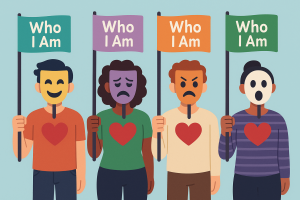
At our core, we’re very emotional6 creatures who highly value our sense of identity7 (sometimes sacrificing our lives for it). As a result, our intuition is at its worst when the information we’re being asked to assess:
- Connects with our sense of identity
- Heightens our emotions or provokes an immediate emotional response
To be clear, we’re not arguing that everyone should be emotionless robots. Emotions are fundamental to our human relationships and our shared and personal human experience. But when it comes to assessing the accuracy of information, emotions don’t serve us best.
Why Logic Helps
For all the areas we just discussed where intuition fails, it’s important to understand that:
- You’ll still have an intuitive response.
- That intuitive response will feel coherent and correct (although it usually isn’t).
When things feel right, that tends to demotivate us from learning more about the topic and checking if our feeling matches reality. This means that it’s very easy to end up thinking we have a better understanding of the world than we actually do.
Using logic helps us gain a more accurate view of the world by applying rules and techniques that circumvent our errors of intuition. It’s why logic is the backbone of the scientific method — without which we wouldn’t have anything from asphalt-paved roads to life-saving medicine to modern smart-phones.
TL;DR

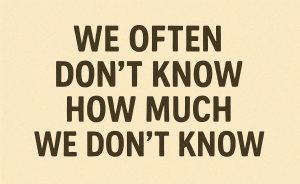
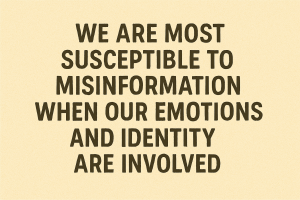
Chapter Quiz and Short Essay
Knowledge Check: Logic and Intuition
Short Essay: Logic and Intuition
Vocabulary
argument
in the context of logic, the claim that’s being made, including how that claim is backed up
better-than-average effect
the tendency to overestimate our ability relative to other people
conjunction fallacy
a cognitive bias where people incorrectly assume that a specific combination of events is more likely than one of the individual events within that combination
correlation-causation error
when we incorrectly assume that because there is a correlation between two things, one must be causing the other
gambler's fallacy
the mistaken belief that past random events can influence future outcomes in independent events
intuition
the immediate sense that something is true or accurate without consciously thinking through reasons or evidence
logic
the set of rules and principles we use to determine whether a conclusion correctly follows from the information or assumptions of an argument
References
1 Wikipedia contributors. (n.d.). Misuse of statistics. Wikipedia. https://en.wikipedia.org/wiki/Misuse_of_statistics
2 Gershman, S. J., & Ullman, T. D. (2023). Causal implicatures from correlational statements. PloS one, 18(5), e0286067. https://doi.org/10.1371/journal.pone.0286067
3 Sterman, J. D. (1989). Misperceptions of feedback in dynamic decision making. Organizational Behavior and Human Decision Processes, 43(3), 301–335. https://doi.org/10.1016/0749-5978(89)90041-1
4 Kruger, J., & Dunning, D. (1999). Unskilled and unaware of it: how difficulties in recognizing one’s own incompetence lead to inflated self-assessments. Journal of personality and social psychology, 77(6), 1121–1134. https://doi.org/10.1037//0022-3514.77.6.1121
5 Svenson, O. (1981). Are we all less risky and more skillful than our fellow drivers? Acta Psychologica, 47(2), 143–148. https://doi.org/10.1016/0001-6918(81)90005-6
6 Lerner, J. S., Li, Y., Valdesolo, P., & Kassam, K. S. (2015). Emotion and decision making. Annual Review of Psychology, 66, 799–823. https://doi.org/10.1146/annurev-psych-010213-115043
7 Oyserman, D. (2009). Identity-based motivation: Implications for action-readiness, procedural-readiness, and consumer behavior. Journal of Consumer Psychology, 19(3), 250–260. https://doi.org/10.1016/j.jcps.2009.05.008
Media Attributions
- Logic and Intuition © ChatGPT is licensed under a CC0 (Creative Commons Zero) license
- I Have a Good Feeling © ChatGPT is licensed under a CC0 (Creative Commons Zero) license
- Abstract Data © ChatGPT is licensed under a CC0 (Creative Commons Zero) license
- Emotions and Identity © ChatGPT is licensed under a CC0 (Creative Commons Zero) license
- Logic and Intuition Text 01 © ChatGPT is licensed under a CC0 (Creative Commons Zero) license
- Logic and Intuition Text 02 © ChatGPT is licensed under a CC0 (Creative Commons Zero) license
- Logic and Intuition Text 03 © ChatGPT is licensed under a CC0 (Creative Commons Zero) license
the set of rules and principles we use to determine whether a conclusion correctly follows from the information or assumptions of an argument
in the context of logic, the claim that's being made, including how that claim is backed up
the immediate sense that something is true or accurate without consciously thinking through reasons or evidence
when we incorrectly assume that because there is a correlation between two things, one must be causing the other
any statistical relationship, whether causal or not, between two random variables
the systematic ways our minds can lead us to misjudge, misunderstand, or ignore information
the tendency to overestimate our ability relative to other people
a cognitive bias where people incorrectly assume that a specific combination of events is more likely than one of the individual events within that combination
the mistaken belief that past random events can influence future outcomes in independent events

